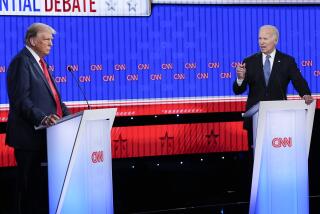The country’s behind a climate bill
- Share via
So much for the climate bill. President Obama’s big speech last week on the BP oil spill was expected to mark the start of a major White House push for legislation aimed at clean energy and climate change, but the second part of that package went down like a crude-coated pelican. Obama’s failure to mention cap-and-trade, or any other scheme to price greenhouse-gas emissions, suggests he doesn’t intend to pursue it.
You can’t fault Obama’s political instincts. He can count votes as well as anybody, and it’s clear that the 60 votes needed to overcome a Senate filibuster on a climate bill just aren’t there. Yet the president’s habit of leading from the rear is in part responsible for that. By using his considerable oratorical gifts to explain the reality of climate change and the urgency of taking action before it causes an environmental and economic catastrophe that would dwarf what’s happening in the Gulf of Mexico, Obama might be able to pressure some senators into his camp. Indeed, there is evidence that the public would back him.
Obama’s pollster Joel Benenson recently found that 63% of likely 2010 voters support charging energy companies for the carbon pollution released in electricity production or gasoline use. Another recent survey by Pew Research had strikingly similar results, with 66% of Americans supporting a bill that would put limits on greenhouse-gas pollution. And Stanford communications professor Jon Krosnick reported poll results in the New York Times earlier this month showing 76% approval for government limits on business’ greenhouse-gas emissions.
The problem with polls like these is that they also show that Americans are pretty clueless about what such carbon limits would entail. In Krosnick’s poll, large majorities opposed taxes on gasoline and electricity, while in the Pew poll, 68% favored expanded exploration and development of coal, oil and gas. It’s inconsistent to back carbon limits on businesses while opposing taxes on fossil fuels, because any scheme for pricing carbon will ultimately lead to higher prices for electricity and gasoline — in other words, it will have the effects of a tax, even if it’s a hidden one. That can be offset by refunding the taxes (or the proceeds from carbon auctions under a cap-and-trade system) to consumers, but there’s no practical way to avoid them. It’s equally silly to support expanded exploration for fossil fuels while trying to cut fossil-fuel emissions.
What the polls really show is that Americans want the government to solve our energy problems, but don’t want to have to pay anything for the solution. That’s not unusual, and it doesn’t just apply to energy. It’s also probably unrealistic to expect Obama to reverse such entrenched attitudes. Yet we suspect that a concerted campaign to explain the scientific conclusions on climate, spell out the expected effects and clearly define the economic costs and benefits would win a lot of hearts and minds.
We don’t actually expect Obama to save the world single-handedly. But it would be nice if he’d make an effort.
More to Read
Get the L.A. Times Politics newsletter
Deeply reported insights into legislation, politics and policy from Sacramento, Washington and beyond. In your inbox twice per week.
You may occasionally receive promotional content from the Los Angeles Times.









